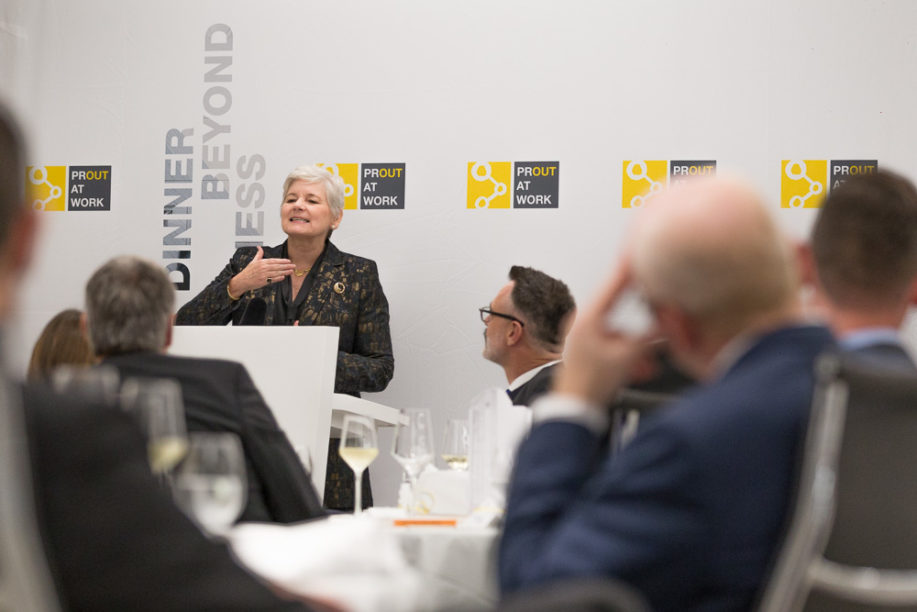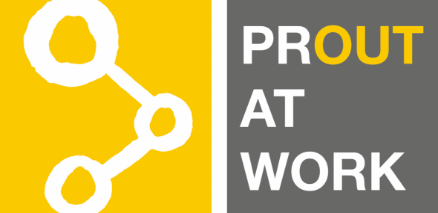
Claudia Brind-Woody
“LGBT*IQ employees need to be courageous as well. It is their decision. However, we need to show them the positive consequences of coming out rather than only associating disadvantages with it the way we have done until now.”
Claudia Brind-Woody has been working for IBM since 1996 and is the corporation’s Vice President as well as Managing Director of Global Intellectual Property Licensing, making her one of the most influential homosexual women in international business and a key figure in many LGBT*IQ organisations. These days, the IT and consulting corporation supports more than 40 of them in 30 countries, and this open attitude is instrumental in an LGBT*IQ-positive corporate philosophy taking root in other companies as well. In the past few years, Brind-Woody has not just been awarded a number of equal rights awards, she has also been a constant presence in the international rankings of the most influential lesbian personalities. In doing so, she exemplifies what she demands of other corporate leaders and has indeed made the title of her DINNER BEYOND BUSINESS keynote: “Authentic Leadership.”
Hearing Claudia Brind-Woody talk about both the necessity and the opportunities of an LGBT*IQ-positive corporate philosophy, it’s hard to avoid an emotional rollercoaster. Knowing smiles appear on the audience’s faces when the Vice President of IBM relates how she was recently told in Japan that there were no gay or lesbian people amongst the employees, and therefore there was no need for action.
After all, the board members and senior executives who have gathered in the tower of Deutsche Bank AG for the DINNER BEYOND BUSINESS this evening at the invitation of the PROUT AT WORK foundation know only too well that that’s not the case. That every large corporation has a talent pool of employees with an LGBT*IQ background, and that far too often it remains untapped.
Just a moment later, Brind-Woody provokes awkward silence among large parts of her audience when her keynote poses the question of who actually has a list of LGBT*IQ top talents in their own company? Only a very few.
When she broadens the question to whether an opportunity for voluntary self-identification as LGBT*IQ exists in their corporation, barely a hand is raised anymore.
While prepared to admit that Germany’s strict privacy laws prevent any such self-identification, Brind-Woody deplores this fact: “If we don’t know who among our employees has an LGBT*IQ background, how are we going to promote them systematically?”
A dinner guest wants to know how to implement mentoring programmes for LGBT*IQ employees without requiring a coming out on their part.
Brind-Woody’s response is surprising but unequivocal: “LGBT*IQ employees need to be courageous as well. It is their decision. However, we need to show them the positive consequences of coming out rather than only associating disadvantages with it the way we have done until now.”
After all, she explains, authentic leadership also means being able to put together teams with a diverse composition.
“A soccer team that only consists of strikers will never win a match. Without the goalie in his flashy colours, it’s just not going to work,” Brind-Woody draws a parallel between business and sports. “After all, business is about winning, too.”
‘Walk the talk’ – following words with deeds
Claudia Brind-Woody has been working for IBM since 1996 and is the corporation’s Vice President as well as Managing Director of Global Intellectual Property Licensing, making her one of the most influential homosexual women in international business and a key figure in many LGBT*IQ organisations. These days, the IT and consulting corporation supports more than 40 of them in 30 countries, and this open attitude is instrumental in an LGBT*IQ-positive corporate philosophy taking root in other companies as well.
“What’s the use of having brilliant strategy papers on diversity up here at the top management level when at the same time a homophobic supervisor in middle-management obstructs the professional careers and thus the lives of many of our talents with an LGBT*IQ background?”
In the past few years, Brind-Woody has not just been awarded a number of equal rights awards, she has also been a constant presence in the international rankings of the most influential lesbian personalities. In doing so, she exemplifies what she demands of other corporate leaders and has indeed made the title of her DINNER BEYOND BUSINESS keynote: “Authentic Leadership.”
By that, she means the mandate to legitimise one’s own leadership role through authentic relationships with one’s employees.
“Can I as the supervisor use the words ‘lesbian’ or ‘transgender’ in a way that gives the other person the impression that it’s not a problem to be like that?”
That, she explains, requires a leadership style from the heart, without fear of making oneself vulnerable. But it also requires following words with deeds. Those who declare that diversity in the workplace is important need to do something about it as well.
“What’s the use of having brilliant strategy papers on diversity up here at the top management level when at the same time a homophobic supervisor in middle-management obstructs the professional careers and thus the lives of many of our talents with an LGBT*IQ background?”
Silence and concern fill the hall on the 35th floor as Brind-Woody explains to the executives in the audience why even today, many LGBT*IQ people avoid coming out in their workplace. She tells them about the increasing number of lesbian, gay or trans* children and adolescents in the US who are thrown out of their homes by their parents and driven into homelessness. About the equally increasing suicide rate amongst those teenagers.
“Muslim, Jewish or dark-skinned child may experience bullying in the schoolyards, too. But they come home and receive understanding and support from their families, because their parents are Muslim, Jewish or dark-skinned themselves. However, that usually isn’t the case for parents of lesbian, gay, transgender or genderqueer children.”
In terms of the aspiration for authentic leadership, she says, this means learning to be able to motivate and support employees who are different from ourselves.
Many, herself included, have been too silent in the past when discriminatory decisions were made or hurtful words were chosen. “But silence is not a leadership style,” Brind-Woody summarises succinctly.
At the end of her keynote, she calls on executives to be more courageous and assertive, even if that occasionally means having to go against the flow.
“Of course being successful is wonderful. But doing something meaningful is even better.”
This year, almost 30 board members and senior executives of Lufthansa, Vodafone, IBM, Commerzbank, Deutsche Bank, Fraport, the European Central Bank, Randstad Germany, Accenture, White & Case, Sandoz, Oliver Wyman, Linklaters, Bayer, Procter & Gamble, Hogan Lovells Merck, Mainzer Verkehrsgesellschaft [Public Transport Mainz], KPMG and Google once again accepted the invitation of the PROUT AT WORK foundation to discuss the advantages of diverse and equal-opportunity leadership in a casual atmosphere over dinner.
Video of Claudia Brind-Woody’s speech:
